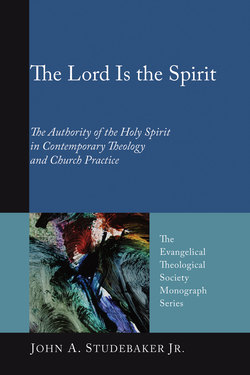Читать книгу The Lord Is the Spirit - John A. Studebaker - Страница 6
На сайте Литреса книга снята с продажи.
Preface
ОглавлениеThe evidence for “the authority of the Holy Spirit” within the Church is certainly more abundant than the books written on the subject! This critical yet undefined doctrine, however, can no longer be ignored. Contemporary theology is often challenging the Church’s understanding of the person and work of the Holy Spirit with “non-authoritative” (i.e., panentheistic, universalistic, experiential, and domesticating) approaches.
The Spirit’s authority with respect to the Church, however, can be demonstrated through a proper understanding of the Spirit’s place within the “pattern of divine authority” derived from Scripture. Chapter one shall define this pattern as the revelation of God’s authority with respect to Christ, the Scriptures, and the Holy Spirit. The principle of authority introduced here holds that divine authority is located in the Triune God (Father, Son, and Spirit) and is revealed through an execution of this pattern.
Chapter two delves into the several debates in Church history concerning the doctrine of the Holy Spirit (“pneumatology”). These debates will allow us to discern provisional “definitions” of the Spirit’s authority in relation to the pattern of divine authority.
Chapters three and four probe the most critical passages of Scripture for developing a biblical and systematic understanding of the Spirit’s authority. These passages are exegeted and utilized according to a specified methodology. Then they are used to respond to postmodern and contemporary “pneumatologists” and to develop formal descriptions of the Spirit’s authority for Systematic Theology.
Chapters five, six, and seven present three specific areas of local church life and practice—Hermeneutics, Church structure and guidance, and Christian spirituality—where our model of the Holy Spirit’s authority (developed in chapters three and four) may be applied. This application will also allow a biblical response to be made to contemporary theologians who are attempting to associate the Spirit with such practices.
Chapter eight offers specific conclusions and further implications of this “new” doctrine—with respect to evangelical theology, contemporary theology, and other practical fields not yet studied.
